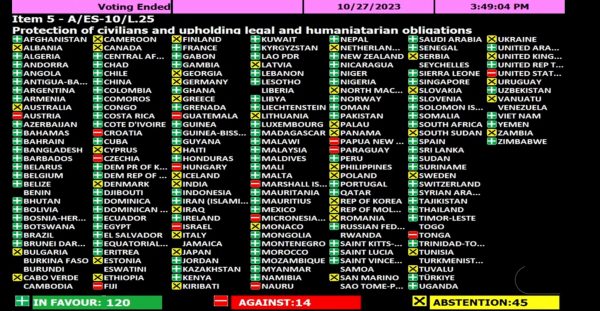The governments of Greece, Germany, the Netherlands and Italy were heavily criticised for abstaining on a UN resolution calling on Israel to abide by a humanitarian ceasefire without condemning Hamas.
On Friday, Jordan submitted a resolution to the UN General Assembly session. Germany, the US and several other countries tried, but ultimately failed, to include in the resolution a condemnation of Hamas terror. Instead, a version calling for a ceasefire and generally condemning violence against civilians was adopted. 120 countries voted in favour of this version of the resolution.
Foreign Minister Annalena Baerbock (Greens) abstained from the vote, following a weekend of criticism from various parties and civil society in Germany. Baerbock said in a statement after the vote:
Because the resolution does not clearly name Hamas terror, does not call for the release of all hostages clearly enough, and does not affirm Israel’s right to self-defence, we decided with many of our European partners not to vote in favour.
The Tagesspiegel newspaper, citing government sources, reported that the decision to abstain was agreed between the Greens-led foreign ministry and the Social Democrat-led chancellery, rebuffed by a third coalition partner, the liberal FDP. FDP general secretary Bijan Djir-Sarai told the newspaper:
The vote of the foreign ministry is disappointing and incomprehensible.
Israeli Ambassador to Germany Ron Prosor, who said abstaining was “not enough”, was also criticised by the conservative opposition parties CDU and CSU.
The Dutch delegation said it abstained from voting because Israel’s right to self-defence had been overlooked and there was insufficient emphasis on the release of hostages. Prime Minister Mark Rutte (VVD/Renew) stated during a radio interview on Saturday:
We abstained because there were a lot of good things in that resolution, but it also called for a ceasefire, and that means Israel does not have the right to defend itself. We believe that Israel does need to be able to defend itself. There is no future for Israel otherwise.
Human rights organisations and lawmakers have condemned the move. Socialist lawmaker Jasper van Dijk (SP/EU Left) wrote on X.
Heaviest attacks so far on Gaza, communications disabled, ground war imminent. But the Netherlands remains silent at the UN. Shameful!
Dutch parties D66 (Renew) and SP called for an emergency debate in parliament to discuss the issue. D66 lawmaker Sjoerd Sjoerdsma wrote on X:
D66 wants a debate on Gaza next week. Instead of a ceasefire, we see an escalation of violence. Instead of access to aid, we see an ongoing blockade. This leads to many civilian casualties and a more unsafe Israel.
While Italian Prime Minister Giorgia Meloni is defending her government’s decision, leftist lawmakers are calling the government’s abstention a “grave mistake.” Meloni believes it is in line with the position of many other European and G7 countries concerned about the escalating conflict in the Middle East. Italian Foreign Minister Antonio Tajani said:
It was not acceptable (…) The resolution was not balanced.
PD Secretary Elly Schlein claimed:
I think it was a mistake. Good thing France, Spain, and Portugal did vote for it. Call it a truce, call it a humanitarian ceasefire, call it a humanitarian pause, just stop this slaughter of civilians. The concern is enormous.
Former prime minister and 5 Star Movement leader Giuseppe Conte told:
Peace requires a straight back and courage, not the weakness and cowardice of a government that shows it considers the suffering of civilians a dramatic but inevitable side effect of war.
Syriza main opposition leader Stefanos Kasselakis said the UN vote was a “day of shame” for Greece. He added:
[It was] a day of shame for Greek diplomacy, the Greek people and their history. Even now, Greece must take the lead in efforts for a ceasefire, averting the humanitarian crisis and the release of hostages, instead of becoming more and more trapped in a security-dangerous, one-dimensional foreign policy of the given ally.
